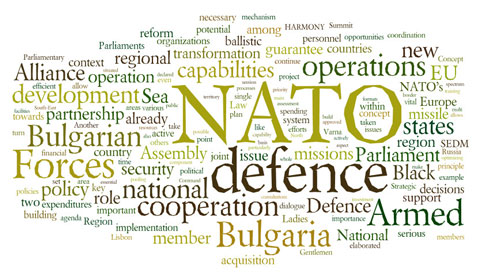A word cloud of the speech by Mr. Anu Anguelov, Minister of Defence of the Republic of Bulgaria, at the spring session NATO Parliamentary Assembly in Varna on 29 May 2011. Full text follows below.

Mister Chairman,
Ladies and Gentlemen members of NATO Parliamentary Assembly,
I take exceptional pleasure to welcome you to Varna, where you have convened for NATO Parliamentary Assembly spring plenary session. We are honoured that after Bulgaria’s accession to NATO seven years ago, we are hosting an Assembly session again. NATO Parliamentary Assembly provides an essential link between NATO and the National Parliaments which in turn, at national level, guarantee the necessary parliamentary support for the implementation of the Allied policies. Today the Alliance is facing major challenges as a result of the implementation of the new Strategic Concept, the Lisbon Summit decisions,common structures
transformation, missions and operations. All these tasks cannot be successfully performed without the solid understanding of their significance on the part of our communities. This support can be achieved through the mission of national Parliaments.
Ladies and Gentlemen,
Please allow me to drive your attention to some vital issues of the Bulgarian defence policy, regional and NATO-wide partnerships and the endeavours we are to undertake towards NATO and national Armed Forces transformation.
Key Points of the Bulgarian Defence Policy
In the context of the launched smart defence concept, Bulgaria has undertaken structural reform of the Armed Forces. I would like to emphasize on the role of the Bulgarian Parliament for the implementation of the Bulgarian defence policy as a NATO member and to extend our gratitude to the members of the
Parliament for their commitment to the reforms. In 2010, the Parliament approved the White Paper on Defence and the Armed Forces. This year the National Assembly endorsed the National Security Strategy of the Republic of Bulgaria. These two documents opened the road to a large-scale transformation of the Bulgarian Armed Forces. Their adoption by the National Assembly is a guarantee that the processes have gained wide public support. The contacts between the Ministry of Defence and the Parliament are immediate and dynamic and are vital for the achievement of both political consent and national consensus.
The role of the Parliament in the Armed Forces modernization processes is decisive. According to the Law on Defence and the Armed Forces, each investment project whose value exceeds 50 M €, is to be approved by the Parliament. This is yet another oversight mechanism over the acquisition of expensive armament systems and is an expression of our aspiration at maximum transparency, accountability and good management of government spending.
Nowadays when in almost all NATO states the defence budgets are reduced, we cannot allow ineffective expenditures. We are aware that national decisions in the area of defense have direct impact on the Alliance joint capabilities.
Bulgarian Armed Forces Reform
The build-up of a single set of forces, operational both on the territory of the country and abroad, is the essence of changes in the Bulgarian Armed Forces.
The single set of Forces should be capable of performing national missions along with NATO and EU operations. The second very important principle is to increase their usability to the maximum.
The core of our defence policy is the collective defence, whose fundamental principle is Article 5 of the North Atlantic Treaty. We have to build capacity and to be determined to invoke, if necessary, Article 5. My understanding is that HATO needs more precise mechanism for invoking art. 5. That means at least two things. First, detailed contingency plan for every and each country member of NATO must be elaborated and second – no one country member should have the right to pose a veto on the activation of this plan and the use of assets of NATO when an act of aggression occurs. Then only the national parliaments will have the proper reason of diminishing defence expenditures. Then only our societies will feel safe and the credibility of NATO will be high.
The Bulgarian Armed Forces reform is to allow us more pragmatic allocation of financial resources. Our aim is to transfer more funds on capital expenditure, training and exercises while cutting operating and maintenance expenditures. This is a painful process as it calls for considerable personnel downsizing. The
outcome, however, will be better trained and equipped Armed Forces capable of covering the full spectrum of national defence tasks and NATO and EU missions and operations.
We all realize that for the defence sector a solid legal basis is crucial. In this context, the Government has elaborated and the Bulgarian Parliament already adopted respective amendments to the Law on Defence and the Armed Forces to guarantee the reforms. In progress is the development of Draft Laws on Military Intelligence and the Law on Reserve while the Law on Military police has been passed at first reading.
All our efforts adhere to the principle of full accountability, parliamentary and public oversight. Annually, we elaborate and introduce to the National Assembly a Defence and Armed Forces Status Report which provides assessment of what has been planned and implemented.
Smart Defence
The severe financial crisis has put our states’ defence establishments on trial. The implementation of already taken commitments, among which contribution to operations, Armed Forces transformation and others, is hindered. To overcome this, the smart defence concept was launched, aiming at better use of resources with more coordination and more coherence.
The issue of generating the necessary defence capabilities with less money has found an explicit solution in the concept of inter-Alliance joint capabilities acquisition. In order to acquire and maintain capabilities, to secure personnel training, we will rely on even closer coordination. In this vein, based on the concept of pooling and sharing, Bulgaria will seek closer cooperation with other members of the Alliance.
We consider NATO a successful system for identification and recommendation on the pooling opportunities we are looking into. No doubt, such solutions call for strong political will within the individual member states. Are we willing to agree on certain compromises? Are we ready to give up what we may
consider important from national point of view? So that we provide added value to the joint capabilities of the Alliance? This issue is very serious. Yet this is an issue where the roles of both the Executive Authorities and the Parliament are of greatest significance.
The new Strategic Concept clearly identifies capabilities development as a key component of NATO-EU strategic partnership. The countries have only one set of forces to be employed in the most efficient way. In the current situation of budget constraints the need of NATO-EU partnership is even more urgent. Such
partnership can encompass various areas as cyber defence, countering improvised explosive devices, medical support, transportation and logistics within a theatre of operation, etc. We expect that NATO – EU Capability Group will become a forum for exchange of ideas in the context of multinational cooperation.
Regional Cooperation
I would like to point out that Bulgaria has already extended proposals to neighbouring countries to look into possible areas for cooperation or joint activities. The multinational cooperation on capability building will provide South-Eastern Europe states new opportunities, which otherwise we could not
individually afford or would have to postpone for the future. In this context, we have already started consultations with some Allies to identify potential projects of mutual interest. We signed an Agreement on Air Policing with Greece. Similar Agreement is ready to be signed with Romania. The idea has been discussed with Turkey. Our goal is to cover the whole NATO’s Southern Flank through identical Agreements to guarantee efficient interaction among Allies.
Another example in this respect could be the acquisition of high-tech, high-value assets. Cooperation in the course of acquisition procedures can considerably reduce costs and enhance capabilities. As an example several NATO member states in the region plan to acquire multi role fighter. Such an approach is essentially new for our states and here national Parliaments can demonstrate true leadership. Regarding Bulgaria, the investment project for acquisition of a new multi role fighter will be adopted by the National assembly Bulgaria consistently and actively supports the European and Euro-Atlantic perspective and efforts of South-East Europe states. I cannot but share my satisfaction with the successful development of the most comprehensive defence regional project – the South-East Europe Defence Ministerial Process (SEDM).
For the last two years, Bulgaria has been chairing the Process. This has been a fruitful period marked with milestones as Montenegro and Serbia’s fullfledged SEDM membership and the launch of new ideas and initiatives. SEDM can work as a regional platform, thus allowing for the fullest employment
of the opportunities provided by EU and NATO, and offer an impetus to the Euro-Atlantic integration of the countries in the region. The time has come, however, to move on, to focus on the pragmatic aspects of cooperation avoiding duplication and optimizing spending.
One of the most ambitious projects within SEDM is the Multinational Peace Force South-Eastern Europe (SEEBRIG). Established in the context of trust and security building measures in the 1990s, the Brigade is to undergo serious transformation. The Bulgarian Chairmanship has put on the agenda the issue of
the Brigade’s employability in missions and operations.
The Black Sea Region
Ladies and Gentlemen,
The very fact that the Spring and Annual Sessions of the PA will be held at the Black Sea coast, in my opinion, sends a profound message that the Region has a vital role for the security, as stated at the Lisbon Summit. The region is a crossroad of Europe and Asia and it is crucial not to turn it into a border, a line of partition.
The time is ripe to take concrete steps. The region offers a rich potential for trade, economic, cultural development. Yet, this potential cannot be fully utilized without NATO and EU active role in Black Sea security. The protection of energy infrastructure is a key priority to which not a single country can be
indifferent. That is why NATO is to build a capacity allowing for its efficient solution.
Bulgaria will continue to actively work towards the elaboration of diverse policies of both organizations towards the Black Sea Region. This will be also matched with new forms and mechanisms of enhanced regional cooperation, especially with other NATO and EU member states. Beyond question, already existing cooperation formats should be fostered, among which BLACKSEAFOR with the participation of all six Black Sea states and BLACK SEA HARMONY operation of the Turkish Navy.
Further to its active policy in the Black Sea region, recently Bulgaria has taken the initiative to start talks with Turkey on collaboration within BLACKSEA HARMONY. In April 2011 in Varna, we conducted a bilateral expert meeting between Bulgarian and Turkish Navy representatives. We believe that Bulgaria’s cooperation in BLACK SEA HARMONY operation could basically turn the initiative into a regional format. Developing regional formats will guarantee the enhancement of maritime security.
Russia
Speaking of the Black Sea region, we cannot but mention Russia. We think that NATO-Russia relationships avail of serious potential for development, in the area of countering terrorism and crisis management, among others, and it is necessary to continue the constructive dialogue and seek common ground.
Presently, a significant issue is NATO-Russia discussion concerning ballistic missile defence. Consultations on ballistic missile defence should continue while future decisions should not impact NATO’s capability of independent action. We believe that the cooperation between NATO and Russia in the area of
ballistic missile defence should be aiming at the achievement of coordination between two separate, independently functioning systems. It would be supportive for the dialogue to take reciprocal steps towards trust building, and in particular, fostering transparency.
Ballistic Missile Defence
As a state situated at NATO’s external border, Bulgaria strongly supports the development of NATO Anti-missile defence, the more so as the country is situated in proximity to regions from where ballistic missile threat can arise. Bulgaria has repeatedly declared willingness to discuss all options of the system
development, including component deployment on its territory. In any case, we will contribute to the establishment of ballistic missile defence system according to its configuration.
NATO Partnerships
An issue of extreme importance to regional security and stability is the development of NATO Partnership policies. The Lisbon Summit declared the key importance of the active Alliance policy regarding partnership, dialogue and cooperation with states and international organizations. While preserving the
existing partnership framework, the new policy allows the Alliance to proceed to a more inclusive, meaningful and flexible policy focused on new Strategic Concept goals. Another important aspect is the role of our partners in shaping strategy and decisions on NATO-led operations to which they contribute.
In this vein, I would like to touch on the importance of the active partnership of NATO with other international organizations, particularly with the EU and the UN, on defence and security-related issues. As a NATO and EU member, Bulgaria considers a key priority the strategic partnership between the two
organizations on the basis of complementarity. We expect an impetus to the three main areas of cooperation: strengthening political consultationsmechanism, substance-driven cooperation in operations and capabilities development, while optimizing expenditures and avoiding overlapping.
Bulgaria and some others member-states have valuable experience in the Armed Forces transformation, security and defence reform. This fact allows us to share the lessons learned with other countries from the Black Sea Region, North Africa and the Middle East, helping them to avoid the difficulties wehave encountered and apply the good practices we have elaborated.
Missions and Operations
NATO’s main task to guarantee the peace, security and defence of our countries,communities and Forces is closely linked with the ongoing missions and operations. Today NATO leads operations, requiring serious efforts and availability of a broad spectrum of capabilities, in various parts of the world. Operation issues are essential to the Alliance in general and are in the permanent focus of the Ministers of Defence. On our agenda is the development of ISAF Phase 4 (Transition). We have to analyze and make a decision on Ocean Shield counter piracy operation perspectives. Forthcoming is the Libya Unified
Protector operation analysis and the assessment of its contribution to Libya conflict resolution as a whole. This operation was a test of its kind of the Alliance Command system readiness for timely and relevant response.
I am not going to dwell on the details of NATO-led missions and operations. I would only point out that presently Bulgaria participates in various Alliance missions and operations. What is more, despite the financial constraints, we have even managed to increase the number of participating personnel. Another
example is the current participation of a Bulgarian frigate in the Unified Protector operation.
We have to bear in mind, besides the success of the military aspect of the operations, the building of civilian facilities and infrastructure, the promotion of NATO military personnel positive image among the population. Of course, all possible measures should be taken to prevent incidental fatalities and nonmilitary facilities destruction.
Reforms in NATO
As I already mentioned at the beginning, NATO is facing multi-faceted challenges. We are to make important decisions related to NATO Agencies’ reform and their drastic reduction. We are in line for NATO Command Structure reform particularly in view of the geographical location and the possibilities to merge functions. Resource Policies Review is also on the agenda. The outcome of these endeavours is NATO’s improved effectiveness at reduced spending. At the same time, to be able to successfully accomplish all these activities, we will need consistent support, and most of all by you, the representatives of the
national Parliaments.
Ladies and gentlemen, thank you for your attention. I wish you an enjoyable and
productive stay in Varna.












